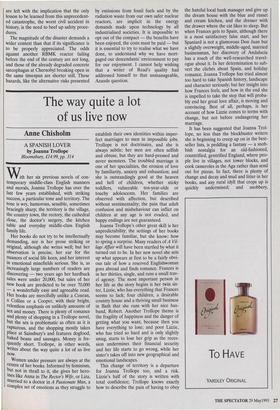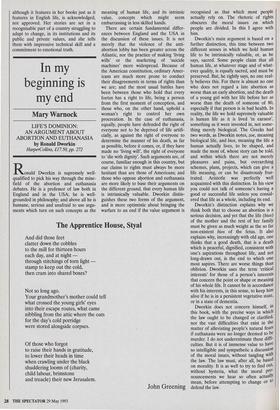The way quite a lot of us live now
Anne Chisholm
A SPANISH LOVER by Joanna Trollope Bloomsbury, £14.99, pp. 314 With her six previous novels of con- temporary middle-class English manners and morals, Joanna Trollope has over the last few years established, with striking success, a particular tone and territory. The tone is wry, humorous, sensible, sometimes bracingly sharp; the territory is the village, the country town, the rectory, the cathedral close, the doctor's surgery, the kitchen table and everyday middle-class English family life.
Her books do not try to be intellectually demanding, nor is her prose striking or original, although she writes well; but her observation is precise, her ear for the nuances of social life keen, and her interest in emotional minefields serious. She is, as increasingly large numbers of readers are discovering — two years ago her hardback sales were under 20,000, but sales of her new book are predicted to be over 70,000 — a wonderfully easy and agreeable read. Her books are mercifully unlike a Conran, a Collins or a Cooper, with their bright, relentless emphasis on unlikely amounts of sex and money. There is plenty of romance and plenty of shopping in a Trollope novel, but the sex is problematic as often as it is rapturous, and the shopping mostly takes place at Sainsbury's and features dogfood, baked beans and sausages. Money is fre- quently short. Trollope, in other words, writes about the way quite a lot of us live now.
Women under pressure are always at the centre of her books. Informed by feminism, but not in thrall to it, she gives her hero- ines like Anna in The Rector's Wife, or Liza, married to a doctor in A Passionate Man, a complex set of emotions as they struggle to establish their own identities within imper- fect marriages to men in impossible jobs. Trollope is not doctrinaire, and she is always subtle; her men are often selfish and obtuse, but they are hard-pressed and never monsters. The troubled marriage is one of her specialities, the erosion of love by familiarity, anxiety and exhaustion; and she is outstandingly good at the heaven and hell of children, whether sticky toddlers, vulnerable ten-year-olds or touchy adolescents. Her families are observed with affection, but described without sentimentality; the pain that adult confusion and misbehaviour can inflict on children at any age is not evaded, and happy endings are not guaranteed.
Joanna Trollope's other great skill is her unpredictability; the settings of her books may become familiar, but she knows how to spring a surprise. Many readers of A Vil- lage Affair will have been startled by what it turned out to be. In her new novel she sets up what appears at first to be a fairly obvi- ous tale of how a reserved Englishwoman goes abroad and finds romance. Frances is in her thirties, single, and runs a small trav- el agency. The most important person in her life as the story begins is her twin sis- ter, Lizzie, who has everything that Frances seems to lack; four children, a desirable country house and a thriving small business in Bath that she runs with her nice hus- band, Robert. Another Trollope theme is the fragility of happiness and the danger of getting what you want; because then you have everything to lose; and poor Lizzie, who has tried so hard and is only slightly smug, starts to lose her grip as the reces- sion undermines their financial security and her life starts to go wrong, while her sister's takes off into new geographical and emotional landscapes.
This change of territory is a departure for Joanna Trollope too, and a risk. Lizzie's half of the story is written with total confidence; Trollope knows exactly how to describe the pain of having to obey the hateful local bank manager and give up the dream house with the blue and russet and cream kitchen, and the dresser with the drawer where the cat likes to sleep. But when Frances gets to Spain, although there is a most satisfactory false start, and her Spaniard is not a glamorous Don Juan but a slightly overweight, middle-aged, married businessman, her discovery of Andalucia has a touch of the well-researched travel- ogue about it. In her determination to sub- vert the clichés about Spain, and holiday romance, Joanna Trollope has tried almost too hard to take Spanish history, landscape and character seriously; but her insight into how Frances feels, and how in the end she is impelled to take the step that will proba- bly end her great love affair, is moving and convincing. Best of all, perhaps, is her account of how Lizzie comes to terms with change, but not before endangering her marriage. It has been suggested that Joanna Trol- lope, no less than the blockbuster writers she is beginning to creep up on in the best- seller lists, is peddling a fantasy — a snob- bish nostalgia for an old-fashioned, countrified, gentrified England, where peo- ple live in villages, not tower blocks, and cook casseroles in the Aga rather than send out for pizzas. In fact, there is plenty of change and decay and mud and litter in her books, and any rural idyll that crops up is quickly undermined; and snobbery, although it features in her books just as it features in English life, is acknowledged, not approved. Her stories are set in a recognisable part of a country struggling to adapt to change, in its institutions and its public and private values, and she tells them with impressive technical skill and a commitment to emotional truth.



















































 Previous page
Previous page